ChangeThis
The original idea behind ChangeThis came from Seth Godin, and was built in the summer of 2004 by Amit Gupta, Catherine Hickey, Noah Weiss, Phoebe Espiritu, and Michelle Sriwongtong. In the summer of 2005, ChangeThis was turned over to 800-CEO-READ. In addition to selling and writing about books, they kept ChangeThis up and running as a standalone website for 14 years. In 2019, 800-CEO-READ became Porchlight, and we pulled ChangeThis together with the rest of our editorial content under the website you see now. We remain committed to the high-design quality and independent spirit of the original team that brought ChangeThis into the world.
-
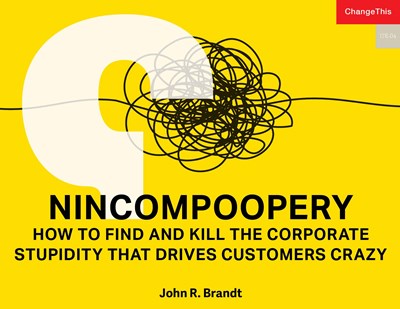
Blog / ChangeThis
Nincompoopery: How to Find and Kill the Corporate Stupidity That Drives Customers Crazy
By John R. Brandt
"Nincompoopery—terrible customer service, idiotic business processes, and soul-crushing management practices—surrounds all of us. We lose time, patience, and profits as stuck-in-the-past organizations actively prevent us (and our customers) from getting the value we (and they) deserve. Can't anybody change this? Why should our customers have to rekey their data multiple times to make a single purchase? Why are there four levels of approval just to order basic supplies? Why can't we get qualified candidates for open positions, or provide new employees with decent training? In short: How did we become such nincompoops? And when will we stop?"
Categories: changethis
-
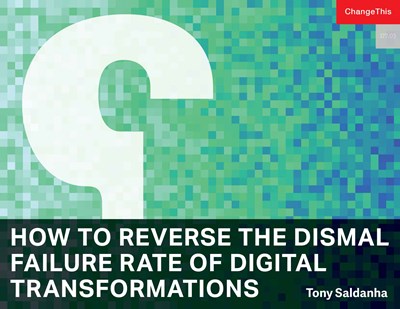
Blog / ChangeThis
How to Reverse the Dismal Failure Rate of Digital Transformations
By Tony Saldanha
"Most digital transformations fail for two reasons: 1) their transformation strategy lacks clarity and 2) they don't choose the right processes for disciplined execution. In short, they fail at the where of digital transformation and the how. The roots of the first part of the problem—the where—lie in the hyped-up, fuzzy interpretations of the term 'digital transformation. ' Every new IT tool, from new communications software to the next release of an SAP upgrade, is called digital transformation. Technology providers use "herd marketing" techniques to move executives to urgent action. Strong board members, CEOs and executives understandably jump at the opportunity to lead change. This necessary and decisive push by them ironically leads to a 'Ready-Fire-Fire' approach instead of 'Ready-Aim-Fire. ' The roots of the second part of the problem—the how—lie in fundamental misunderstandings of the appropriate methodology. Typically, IT projects rely on process improvement methodologies.
Categories: changethis
-

Blog / ChangeThis
It Is Your Right To Be Heard: Why Women's Voices Get Silenced and How to Set Them Free
By Veronica Rueckert
"The voice is an amazing gift, both a privilege and a responsibility. Using it takes courage, especially if you're a woman. We're given only a finite amount of time to figure out what it's for, to grow into ourselves enough that we can speak up when the time comes. Yet a woman's right to speak in public is a right that hasn't been fully granted. Modern research backs this up. In a study of deliberative groups designed to mirror Congress in their gender makeup, women used only 60 percent of the floor time used by the average man. Women are interrupted more often than men, both by men and by other women. Women of color may be disrespected at even greater rates when they speak. A revealing study of the US Supreme Court found that women justices were three times as likely to be interrupted as their male colleagues. Things were even worse for the only woman of color on the court. In 2012, a Yale University study found that when hypothetical women executives talked more often than their peers, study respondents rated their competency down by 14 percent.
Categories: changethis
-
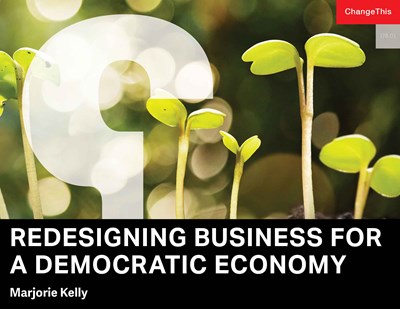
Blog / ChangeThis
Redesigning Business for a Democratic Economy
By Marjorie Kelly
"We find ourselves in a moment of breakdown—but also a moment of unprecedented opportunity. Even as widespread faith in the workings of our economy is falling apart, unsung innovations are quietly arising. Entrepreneurs, business executives, investors, and community leaders are choosing to 'get in front of this problem,' showing how we can move beyond an economy that serves the few to one that serves the many. In scattered experiments—disconnected, often unaware of one another—unsung leaders are beginning to build what so many of us hunger for but can't imagine might be possible: an economy that could enable us all to live well, and do so within planetary boundaries. What's under construction in our time is a new economy that is more inclusive, more sustainable, more equitable, more community-centric—in a word, more democratic."
Categories: changethis
-
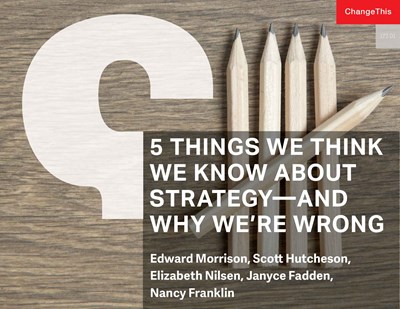
Blog / ChangeThis
5 Things We Think We Know about Strategy—and Why We're Wrong
By Edward Morrison, Scott Hutcheson, Elizabeth Nilsen, Janyce Fadden, Nancy Franklin
"Strategic planning has always been an ineffective tool to lead an organization. Don't believe us? That's the finding of the consulting firm McKinsey, which posits that up to 70 percent of strategic plans fail. The venerable institution of strategic planning is long overdue for at least a major overhaul, if not outright replacement."
Categories: changethis
-
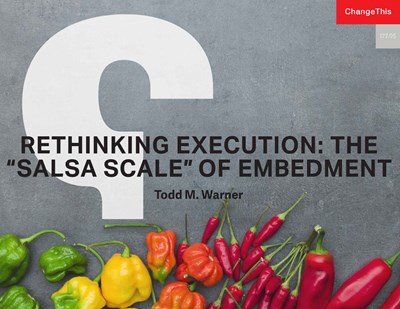
Blog / ChangeThis
Rethinking Execution: The 'Salsa Scale' of Embedment
By Todd M. Warner
"Many organizations run good projects and develop good strategies, with lots of Gant charts, stakeholder engagement and communication plans; they deliver a solid technical output. They probably even have a 'Change Management Plan' that includes briefings and information sharing, but then the Project team is done: The technical solution has been provided, and this output is passed over the fence to Operational Teams. Whatever happens next is not their concern; they have delivered a good 'answer,' even though most Operational Teams never asked the question. Herein lies the problem with execution, and the need to rethink embedment."
Categories: changethis
-
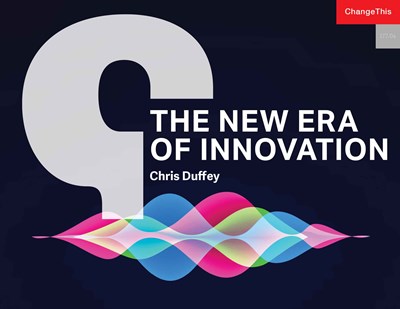
Blog / ChangeThis
The New Era of Innovation
By Chris Duffey
"100 percent of jobs, 100 percent of industries, and 100 percent of professions will be affected by Artificial Intelligence in the next five to ten years, By 2020, companies using AI will take 1. 2 trillion from competitors who don't. Every day, we see or hear another mind-boggling statement about the impact Artificial Intelligence will have on the future. As consequential as these statements are, the truth is that nobody can predict just how profound this emerging technology will be. For example, just look at Amazon. No one could have foreseen that what started out as an online store could have grown to be one of the world's most powerful and valuable companies in the history of the earth, or more specifically, how the "Amazon Effect" would grow a supporting ecosystem comprised of manufactures, logics, and even suppliers like the cardboard box industry—all of which have greatly benefited from Amazon shipments. What we can be certain of is because of new emerging technology like AI, the rate of change will only increase.
Categories: changethis
-
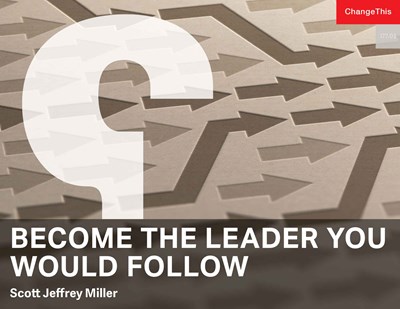
Blog / ChangeThis
Become the Leader You Would Follow
By Scott Jeffrey Miller
"Leadership isn't always rewarding. It can feel like a bottomless pit of problem solving and adult-sitting. Leadership is exhausting, repetitive, and requires a constant stretch of your emotional and intellectual skills. It demands an 'always on' mentality, as you're expected to have all the right answers and make all the right decisions, often on the fly. But it doesn't mean leadership isn't important; on the contrary, often the things we struggle with yield the biggest return. It's okay if you admit that leadership can be hard and unenjoyable, because the benefits of being successful at it can be life-changing."
Categories: changethis
-

Blog / ChangeThis
Want to Be a Great Leader? Hit the Pause Button
By Sara Canaday
"Today's leaders are being asked to both do more AND think more. Is that even possible? I'm a fan of multi-tasking but this seems unreasonable. Expecting leaders to succeed in the context of a constant act-more, think-more, produce-more world is self-defeating, at best. At worst, it could be disastrous for our projects, for our teams, and for our health. So, how do we keep pace and, at the same time, get better as leaders. We do so by questioning—even defying—conventional wisdom."
Categories: changethis
-

Blog / ChangeThis
How to Green Your Company
By Gay Browne
"Traditionally, responsibility means looking out for the bottom line, and reporting financial performance to your shareholders if you are a publicly traded company. In today's world, responsibility is taking on a whole new meaning, including looking out for your employees and the natural environment."
Categories: changethis

